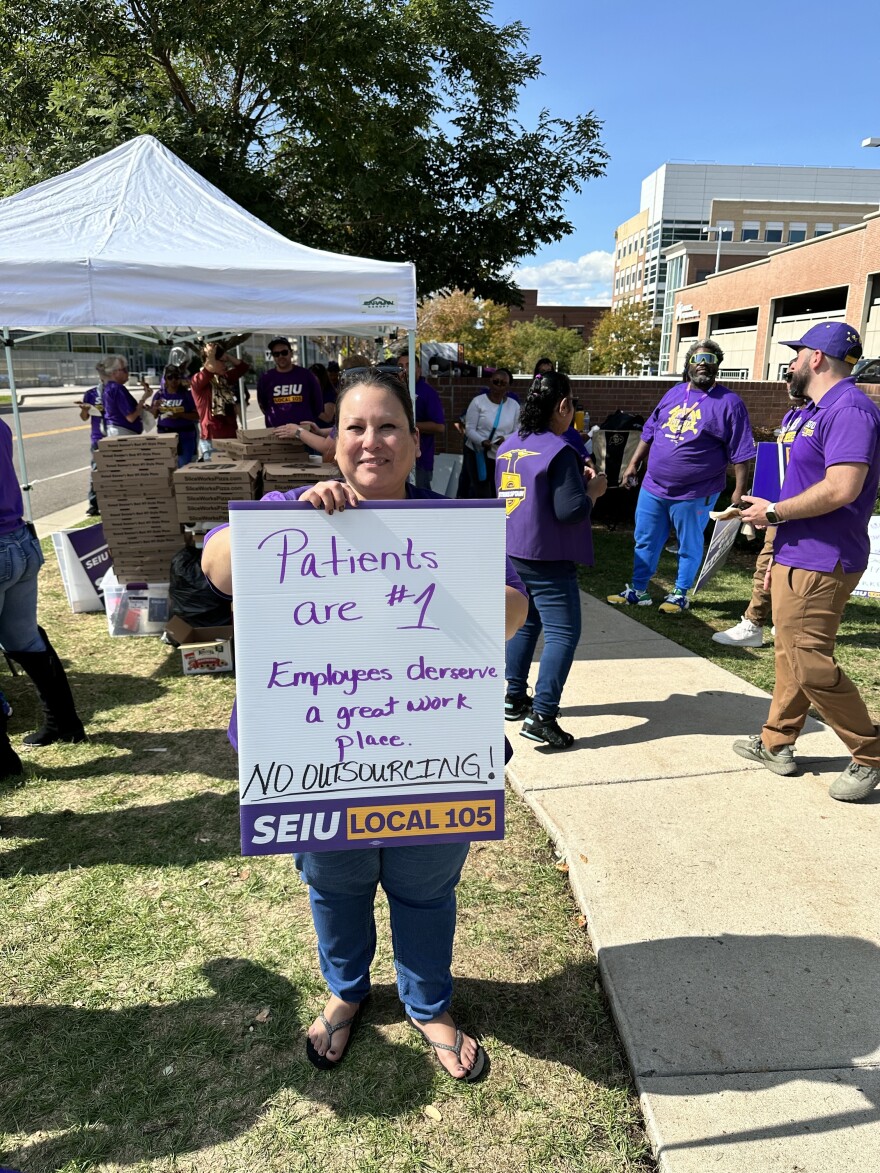Health care workers in Colorado and across the country associated with Kaiser Permanente began a three-day strike Wednesday, demanding better pay and more staffing.
Workers with the Service Employees International Union picketed at Kaiser sites all over the state, from Fort Collins to Denver and Colorado Springs. The strikers include nurses, home health aides, ultrasound sonographers and administrative staff, as well as technicians in radiology, X-ray, surgical, pharmacy and emergency departments. Over 1,400 Kaiser employees are on strike statewide, according to the union, out of an estimated total of 75,000 health care workers on strike across five states.

Justice Wilson, a medical assistant in Kaiser’s Longmont clinic, was one of about 20 people sporting purple t-shirts and signs in support of the strike in Longmont on Wednesday. She said going on strike was a necessary last resort.
“We've been to the table. We've asked them to just hear us out, and we're not getting anywhere with that,” Wilson said. “This is what we do every day and we really are busting our butts to make sure that we're taking care of everything. And you (Kaiser) are just ignoring us.”
Darion Ross, a strike captain at Kaiser’s East Denver Medical Offices, led dozens of people on the picket line Wednesday. Ross said low pay and staffing have been ongoing issues.
“We have been working short staffed for years now. We made it through a whole pandemic,” Ross said. “The only way that we can bring staff in is to be competitive, and right now, as health care workers, we’re underpaid. We were the heroes in the pandemic, and now we’re the zeros.”
In Longmont, Wilson said she has seen the impacts of understaffing and insufficient pay overflow onto the shoulders of local patients.
“It's taking a week or two weeks or six weeks, really, to get people in to see their providers for rashes and sickness and stubbed toes and medications,” Wilson said. “We're setting up follow-up care six weeks out because we just don't have the staff to get people in, in a reasonable amount of time.”
Deanna Gonzales, a Kaiser patient registration associate in Denver, said she’s also seen care negatively affected.

“(Patients) are not getting the care that they need,” Gonzales said. “Everything is compromised. Thier vaccines, everything. Because we are running around, we have absolutely no staff. We're doing the work of three people with one single person."
A statement from Kaiser Permanente said issues like staff shortages and low pay are being felt across the U.S. health care landscape, not just at Kaiser. The company also said it is committed to meeting staff needs.
“We remain committed to reaching a new agreement that continues to provide our employees with market-leading wages, excellent benefits, generous retirement income plans, and valuable professional development opportunities,” a statement released Wednesday morning read.
The strike comes amid unprecedented worker organizing — from strike authorizations to work stoppages — within multiple industries this year, including, transportation, entertainment and hospitality.
Wednesday's strike is the latest one for the health care industry as it continues to confront burnout with the heavy workloads — problems that were exacerbated greatly by the pandemic.
Unions representing Kaiser workers are asking for a $25 hourly minimum wage, as well as increases of 6.5% each year in the first two years and 5.75% each year in the two years afterward. The two sides were able to reach a tentative agreement this week to increase funding for training and education by 40%, but the union rejected the medical group’s other proposals including a raise of up to 3.5%, layoff protections, and increased support for remote workers.
The workers’ last contract was negotiated in 2019, before the pandemic.
Kaiser has also proposed a $21 minimum wage for Colorado employees starting in 2024. The health care company also expects to hire 10,000 new workers by the end of this October.
Meanwhile, the strikers remain. In Fort Collins, Kaiser licensed practical nurse Tonya Stoner said her community has shown significant support for the strikers on day one.
“We've had several people from the community come out. They've brought snacks, drinks. They've stopped and given us high fives. We have people driving by, honking,” Stoner said. “That is very heartwarming.”
If a deal isn’t reached before the three-day strike ends, strikers say they’ll continue to negotiate with Kaiser. Some say they would also be ready to get back out on the picket lines, if necessary.

“We’re here for us and our families, but we’re also fighting for our patients. So we want to get back to them,” Darion Ross in East Denver said. “But we’re willing to do what we need to do. And so if we need to go back out, we will.”
Kaiser Permanente said in a statement Wednesday that medical facilities and urgent care clinics will remain open during the strike and that the company has taken measures to hire contracted workers to fill temporary staffing gaps. Doctors are not participating in the strike.
KUNC reporters Lucas Brady Woods, Alex Hager and Yoselin Meza Miranda as well as the Associated Press contributed to this story.



